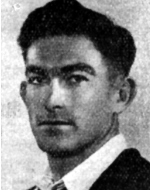Dagi (Herring), Mordechai (Motke)
Son of Chava and Ze’ev, was born in January 1925 in Poland. When he was one year old, his mother and five children immigrated to Israel. The father preceded his family and waited for them in Israel. The strains of the family’s hold were hard and the years of suffering left their mark on Motke’s development and forged his character. While at the elementary school in Petach Tikva, he joined the Hanoar Haoved union and after graduating he left with his comrades for training and later moved to Ginossar. Where he contracted fever and had to leave the kibbutz for a while. He moved to Tel Aviv and was active in the “Hanoar Haoved” branch, as his professional center. With the outbreak of the Second World War he decided to enlist in the British army, but his older brother was ahead of him and his parents refused to enlist, an agreement required for enlistment of the 17-year-olds. Motke found his way to the Palmach and in 1943 joined the training unit in Negba, where he was already prominent in his qualities: seriousness, responsibility, quiet. He was promoted to the rank of commander of the platoon, and later served as company commander, serving as a guide to the Palmach units in Ramat Hakovesh and later in Givat Hashlosha, both as a coach and an educator. A firm commander and a beloved friend of his subordinates. During the period of the struggle against the British he participated in many activities, among other things, in an attack on the British mobile police station in Sarona and in the “Wingate Night”. His qualities made him an ideal underground fighter. He was sent to Cyprus and organized the escape from the camps and the illegal immigration. A few weeks before the 29th of November 1947, the day of the UN’s declaration of partition, he returned to Israel and was about to receive a vacation, which he wanted to exploit to complete his education. Mordechai was called Operation Nachshon, and fought in the ranks of the “Alfortzim” battalion. In preparation for Operation Nachshon, the Kastel, which controls the road and was held by our forces, was conquered. The Arabs carried out a number of counter-attacks in order to return this vital control to their hands and on one night, on the night of April 7-8, their commander Abd al-Qader al-Husseini was killed. On the 28th of Adar II 5708 (1948), the Arab forces carried out a fierce attack to capture the place and find the body of their leader. The Palmach platoon, which belonged to the 5th Battalion of the Harel Brigade, came out as reinforcements for Castel and its men, who hid on the retreating defenders of the Castel, who were buried in Ma’ale Hachamisha on November 19, 1953, He was laid to rest at the military cemetery on Mount Herzl in Jerusalem.
